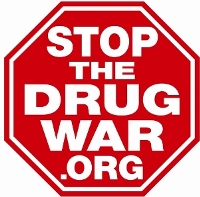Now more than ever, StoptheDrugWar.org needs your financial support to continue to provide this crucial informational tool that builds and empowers the movement. We have a special new offer for those donating $50 or more, and continue our earlier offers with much smaller donations too.
The Mexican government scored a major coup this week with the capture of Miguel Angel "Z-40" Trevino Morales, the head of the powerful Zetas cartel. But will it stem the violence or the flow of drugs? One observer thinks not.
With the arrest of Zetas leader Miguel Angel Trevino Morales on Monday, the two books on the Mexican drug war we review this week couldn't be more timely. Be forewarned, though, some of this is really nasty stuff.
The third petition to reschedule marijuana is not dead yet. Although a federal appeals court upheld the DEA rejection of it, the petitioners are now asking the US Supreme Court to review that decision.
A dispensary opens in Arizona as more get shut down in California and more California communities move to shut them down or keep them out. There's more news, too.
Utah is finding there's not much there there when it comes to drug-abusing welfare applicants, and it's paying good money to do so.
The Michigan House has passed a suspicion-based welfare drug testing bill that would set up a pilot program in three counties. The measure now moves to the state Senate.
The North Carolina legislature is about to pass a welfare drug testing bill. At least they took out the part where county employees had to tell people they wouldn't be tested if they didn't apply for benefits.
Voters in Maine's largest city will decide for themselves whether to legalize the possession of up to 2 1/2 ounces of marijuana after the city council punted rather than adopt a citizen-initiated ordinance.
Two Virginia top cops copped to drug corruption offenses this past week, and that's just for starters. There is more as well.
Interns are making an important difference fighting the good fight with us at StoptheDrugWar.org.
Dear friend of drug policy reform,
StoptheDrugWar.org needs your support more than ever before to continue our work of getting the word out online for the drug policy reform movement, building the movement, and providing this crucial informational tool that reformers around the world use in their work every day. I ask your support at this time with the most generous donation you can afford to enable this newsletter to continue.
For those of you willing to donate $50 or more, I'm excited to announce the authors of three important new works have each agreed to sign at least 25 copies for our newest membership offer!
(Click on the links above for more info on the three books. Phil's reviews of High Price and Race to Incarcerate are online here and here, and a review of Too High to Fail is forthcoming.)
To donate, and to order any of these or other items we offer, please use our online donation form at http://stopthedrugwar.org/donate, or scroll down for info on donating by mail. We are asking donations of $50 or more for a signed copy of any one or these books, $95 or more for signed copies of any two, or $135 or more for signed copies of all three. (If more than 25 people order the books by the time you place your order, we will ask the authors if they're willing to sign more. If that can't be worked out, we'll contact you and offer to make different arrangements, whether for a full or partial refund or to send different items.)
Now, $50 is a little more than we've asked for such items in the past, and of course they can be ordered online or purchased in a bookstore for less. Things have changed in the drug reform funding scene, making our organization more dependent on membership to continue our programs -- I hope you'll choose to support us at this time. Note that we continue to offer a range of books, videos, and StoptheDrugWar.org gift items with donations of as little as $7 -- visit our donation form to see the full list.
Also note that donations to StoptheDrugWar.org can be tax-deductible, supporting our educational work, or non-deductible, supporting our lobbying work. (Note that selecting any gift items reduces the amount of your donation that is deductible -- which with a smaller gift amount can be most of it.) Donations can be made by credit card or PayPal at http://stopthedrugwar.org/donate, or sent by mail to P.O. Box 18402, Washington, DC 20036. If you are donating by check, please make it payable to DRCNet Foundation (if tax-deductible) or Drug Reform Coordination Network (if not deductible). If you wish to donate stock, the information to give your brokerage is Ameritrade, (800) 669-3900), DTC#0188, and account number 781926492 for tax-deductible gifts or 864663500 for non-deductible gifts -- please make sure to contact us if donating in this way.
Thank you for standing with us to stop the drug war's cruelties and meet the opportunity this time offers to make a brighter future. As recent events show, time and the truth are on our side!
Sincerely,

David Borden, Executive Director
StoptheDrugWar.org
Washington, DC
http://stopthedrugwar.org
back to top
(Bernd Debusmann Jr. has lived and worked in his native Mexico for the last two years, most of it as a full-time freelancer for Reuters TV, also contributing to Fox Latino. Previously he worked as a reporter in New York City and as a freelance producer for the Reuters Latin American Television Desk in Washington DC, during which time he dealt with many drug trafficking stories. During 2010 and 2011 he authored the weekly Mexico Drug War Update published by this newsletter, available in our Mexican Drug War archive section.)
On Monday, July 16th, Mexican marines captured Miguel Angel Trevino Morales, the leader of Mexico’s notorious Zetas criminal organization, just outside the border city of Nuevo Laredo, along with his bodyguard, an accountant, some $2 million in cash and eight weapons. How much difference will his capture make on the flow of drugs to the United States? Probably not much.
Trevino Morales, widely known as
Z-40, is the most important criminal figure captured or killed so far during the administration of President Enrique Pena
Nieto, and is widely regarded as one of the most powerful, violent and high-profile violent drug traffickers in the country, having previously served as a regional “plaza” boss in Nuevo Laredo and Veracruz and second-in-command of the organization under his predecessor,
Heriberto Lazcano Lazcano.
Aside from being a key player in the Mexico-US drug trade and other illicit businesses, Trevino is thought to be responsible for the deaths of hundreds, if not thousands, of Mexicans as well as foreign migrants. (He has so far been charged with the kidnapping and murder of 265 north-bound migrants in the San Fernando, Tamaulipas, in 2010 and 2011.)
But what effect will his arrest have on Washington's war on drugs? The unfortunate answer is that it is unlikely to mean much in the long term. History shows that men like Trevino are quickly replaceable, and that business goes on.
His predecessor, Heriberto Lazcano, was gunned down in a firefight with the marines in October 2012, only to be replaced by Trevino. Lazcano's predecessor, Rogelio Gonzalez Pizaña, was arrested in October 2004, just two years after the founder and first leader of the Zetas, Arturo Guzman Decena, was killed in a gun battle with the Mexican army in the city of Matamoros.
Despite being repeatedly decapitated, the organization continued to grow and become more powerful, eventually splitting off from its Gulf Cartel bosses and becoming an independent entity in 2010.
In terms of stemming the flow of drugs to the United States, Trevino's arrest is unlikely to have any positive effect. In a videotaped 2011 interrogation of Jesus Enrique Rejon Aguilar, an army deserter and one of the original Zetas, Aguilar revealed that the Zetas' drug trafficking business is managed by personnel dedicated only to that task.
There is no reason to believe that Trevino's arrest will have any more effect on that apparatus than the arrest of previous bosses. Did the death of Pablo Escobar and the arrest of the heads of the Cali Cartel stem the flow of cocaine from Colombia? No. Did all the kingpins killed or captured under the administration of Calderon (and before) make a difference on the flow of drugs across the Mexican border? No, and neither will Trevino's.
Trevino's arrest, however, is likely to have a significantly negative impact on the level of violence in Mexico. Pena Nieto came into office with a promise to stem the bloodshed, but the events of the last few years have shown that the death or arrest of high-level criminals often unleashes a wave of violence as their underlings fight among themselves, as was the case after the death of Arturo Beltran Leyva in 2009.
The Mexican military has been asked by its government to become very good at decapitating cartels, and they have. But it hasn't made much difference.
In the months before his arrest, Trevino seems to have consolidated his power over the organization, which had experienced factional infighting in 2010 and 2011. While it is likely that Trevino's brother Alejandro (Z-42) will take the reins of the organization, it remains to be seen whether his leadership will be disputed by other high-ranking Zetas, or whether the organization will fragment without a strong leader.
Another possibility is that -- sensing a moment of weakness -- the Zeta's enemies, such as the Sinaloa Cartel under Joaquin "El Chapo" Guzman and the Gulf Cartel, will make a concerted effort to control the city of Nuevo Laredo, long considered the "Crown Jewel" of the Mexican drug trafficking landscape. Previous efforts to wrestle control of the city from the Zetas were extremely bloody, drawn-out affairs.
This isn't to say that Trevino should have been ignored. He is a ruthlessly efficient criminal with blood on his hands. But the triumphant congratulations on the capture from Mexican and US officials may be premature.
The fact of the matter is that a military-focused strategy, or a strategy focused on individuals, is unlikely to have any long-term positive effect in Mexico's Drug War.
As long as Americans want to buy a commodity which the Mexican cartels can supply, they will continue to exist, and violence will inevitably follow as a consequence of disputes in a very profitable, unregulated industry. Any change will have to come from a combination of law enforcement and more sensible drug laws in the United States focusing on demand reduction.
back to top
The Executioner's Men: Los Zetas, Rogue Soldiers, Criminal Entrepreneurs, and the Shadow State They Created, by George Grayson and Samuel Logan (2013, Transaction Publishers, 338 pp., $34.95HB)
Dying for the Truth: Undercover Inside the Mexican Drug War, by the Fugitive Reporters of Blog del Narco (2012, Feral House, 389 pp., $24.95 PB)
With the capture this week of
Zetas leader Miguel Angel Trevino Morales, "Z-40," Mexico's most notorious drug cartel is front page news around the world. Originally composed of highly trained Mexican armed forces personnel gone over to the dark side, the
Zetas served as praetorian guards for the Gulf Cartel of
Osiel Cardenas Guillen -- his enforcers and
hitmen -- before turning on their erstwhile employers after
Cardenas' 2004 arrest and striking out on their own.
Now, the Zetas are locked in a murderous struggle with the Sinaloa Cartel of El Chapo Guzman for domination of Mexico's multi-billion dollar drug smuggling industry. Other players -- the Tijuana cartel of the Arrellano Felixes, the Juarez cartel of the Carillos Fuentes, the battened down remnants of the Gulf cartel, the former Sinaloa cartel allies the Beltran Leyvas, the Familia Michoacana and its successor, the Knights Templars -- have seen their fortunes wax and wane, but mainly wane, in the multisided battle that pits the cartels not only against each other, but against the Mexican state. (Never mind for now that the war also pits various elements of the state against each other in service to the cartels.) The Zetas and the Sinaloa cartel have emerged on top, but they are standing on heaps of bloodied, broken bodies.
Some 80,000 people have been killed in the Mexican drug wars since former President Felipe Calderon declared war on the cartels in late 2006 and tens of thousands more have gone missing. Many of them are undoubtedly spending eternity in the unmarked (and rarely remarked upon) narcofosas (narco-graves) that dot the Mexican countryside. Those mass burial grounds are occasionally uncovered, with hazard-suited workers bringing up 10 bodies, 30 bodies, 100 bodies at a time. Many, if not most, of those mass graves are the work of the Zetas.
In The Executioner's Men, named for Heriberto Lazcano Lazcano, the head of the Zetas for eight years until he was gunned down by Mexican marines last year, College of William and Mary Mexico drug war scholar George Grayson and coauthor Samuel Logan tell the sobering story of the group's origins, its bloody-minded rise to prominence among the country's competing cartels, and its steady expansion, both geographically into Central America and entrepreneurially into human smuggling, extortion, and other rackets. It is a highly researched and detailed account of one of the most sadistic criminal organizations on the planet.
The Mexican drug war has generated an extensive literature, much of which has been previously reviewed in these pages, but The Executioner's Men stands out as a truly magisterial study of an organized crime group. With its (sometimes mind-boggling) naming of names and its contextualization of events, Grayson and Logan's work will for years to come remain a crucial sourcebook for students of the Zetas and Mexico's drug wars in general. Except they're going to have to update it -- it was written before the killing of El Exterminador Lazcano Lazcano, and now his immediate successor has been removed from the field of play, too.
Will the arrest of Z-40 mark the end of an era for the Zetas? Grayson suggested as much in post-arrest interviews this week, saying he thought they would decline into a number of squabbling factions. Others are not so sanguine, predicting lethal struggles for power among Zeta lieutenants and Sinaloa cartel moves to take advantage of the disarray in their rivals' ranks. Only time will tell, and we await the next edition of The Executioner's Men to make sense of what will be going down.
If
The Executioner's Men is scholarly and erudite,
Dying for the Truth is something entirely different, but equally powerful, if not more so. It reprints verbatim (in English and Spanish on alternating pages) a year in the life of the Blog del
Narco, a Mexican web site that appeared late in the last decade to chronicle the drug war stories it claimed the mainstream Mexican press was too terrified to cover. (There is some controversy over this and other claims made by Blog del
Narco lead author "Lucy," who has fled Mexico in the wake of the killings of two of her collaborators and the disappearance of another. Here is
Bernd Debusmann Jr.'s take on it.)
The Mexican press had and has reason to be frightened; the country is one of the most dangerous in the world for journalists. At least 84 reporters have been killed since 2000 and another 20 or so have simply vanished, according to Mexican human rights sources. Many -- though by no means all -- have been killed by the narcos for paying too much attention to them and their doings.
Blog del Narco (which I followed online during 2010, the year covered in the book) said it would provide the coverage missing from the mainstream press, and whether or not it cribbed material from other outlets, it also presented much information that would otherwise have never have seen the light of day. Its blogging format allowed anonymous contributors to post items, which in turn allowed the cartels to use it as a medium for sending messages. Too often, those messages were sent via horrifying videos or photos. If they were designed to terrify, it works. (This, too, has raised questions about just what Blog del Narco was trying to accomplish.)
If it were a work of literary artifice, Dying for the Truth would be wildly and stunningly successful. Like JG Ballard doing bad acid after a three-day meth bender, the anonymous contributors drag readers through a nightmarish and surrealistic Grand Guignol via a multimedia mix of torture/execution videos, interrogation transcripts (almost always followed by the execution of the prisoners by heavily armed masked men in paramilitary garb), gruesome atrocity exhibition photos (skinned faces sewn onto soccer balls, anyone?), charts and graphs, and the day-by-day killings, bombings, shootouts and busts that constitute Mexico's drug wars.
But unfortunately, Dying for the Truth is no work of inventive fiction. It is all too real, as are the dismembered, disemboweled, and decapitated victims whose remains it displays. WARNING: DO NOT BUY OR EVEN LOOK AT THIS BOOK IF YOU CANNOT TOLERATE HORRORIFIC IMAGERY. This is deeply, deeply disturbing stuff. I watched some of those videos when they first appeared on Blog del Narco, and they will haunt me for as long as I live.
Warnings aside, Dying for the Truth serves purposes beyond spreading narco-messages and scaring the hell out of people. Once you get past (or block out) the imagery, you have a fairly comprehensive narrative of a bloody year in Mexico's bloody drug wars. Those killings that may appear senseless when they sporadically show up in US media accounts -- 13 handcuffed bodies found on the roadside here, a row of human heads sitting in a park there, a pile of dismembered body parts over there -- take on a certain savage logic when chronicled as tit-for-tat responses in an ongoing battle between amoral killers.
Drug prohibition cannot be blamed for the sadistic savagery of Mexico's drug wars. At the risk of sounding like a pop psychology pontificator (and suffering the "national character" fallacy), I would suggest there is something in the Mexican national character at play here. It is a society founded by two competing bloody theocracies, the human-sacrificing Aztecs on one hand and the "Cross and Sword" Spanish Catholics on the other. It's the country of Posada's famous skeletons and the candy skulls of Day of the Dead. It's the country where the statues of Christ in the Catholic cathedrals are the bloodiest and most wounded anywhere. It's the country where tabloids like !Alarma! have specialized for decades in displaying dead and battered bodies. Add in lots of booze and cocaine, multi-billion dollar stakes, ruthless military training, deep-rooted corruption and brutality, and here we are.
That said, while there may be something in the Mexican psyche that has turned these cartel wars into the stuff that would give Syrian jihadis the heebie-jeebies, it is of course drug prohibition that has provided the oxygen that allows such evil to flourish. Given the spread of the cartels into other economic spheres, even if we were to legalize everything tomorrow, this nightmare isn't going away easily. But that would be a good start.
back to top
The people behind a decade-long effort to reschedule marijuana out of the Controlled Substance Act's (CSA) Schedule I have now complied with a vow they made when the DEA's decision to reject the effort was upheld by a federal appeals court in Washington. On Monday, Americans for Safe Access (ASA) filed a writ of certiorari asking the US Supreme Court to review the case.
Filing the writ does not mean the Supreme Court will decide to take up the case. The high court receives thousands of such appeals each session, but actually decides to hear only a tiny percentage of them. This writ, however, has two things going for it: It is on the paid certiorari docket (most are not) and it argues that the Supreme Court needs to resolve conflicts between federal appellate courts.
With the appeal, petitioners are challenging what they call an unreasonable and unprecedented standard for proof of medical efficacy of marijuana set by the District of Columbia Circuit Court of Appeals, which upheld the DEA's denial of the petition.
"To deny that sufficient evidence is lacking on the medical efficacy of marijuana is to ignore a mountain of well-documented studies that conclude otherwise," said ASA chief counsel Joe Elford, who argued the appeal before the DC Circuit in October of last year. "The Court has unreasonably raised the bar for what qualifies as an 'adequate and well-controlled' study, thereby continuing the government's game of 'Gotcha.'"
In 2002, the Coalition for Rescheduling Cannabis, made up of several individuals and organizations including ASA, filed a petition to reclassify marijuana for medical use. That petition was denied by the DEA in July 2011. The appeal to the DC Circuit was the first time in nearly 20 years that a federal court has reviewed the issue of whether adequate scientific evidence exists to reclassify marijuana. Before the January ruling, the DC Circuit had never granted plaintiffs the right to sue when seeking reclassification of marijuana.
But while the DC Circuit granted plaintiffs standing, it denied their appeal on the merits in a 2-1 ruling, by setting a new, virtually-impossible to meet standard for assessing medical efficacy. Although ASA cited more than 200 peer-reviewed studies in its appeal, the DC Circuit held that plaintiffs must produce evidence from Phase II and Phase III clinical trials -- usually reserved for companies trying to bring a new drug to market -- in order to show marijuana's medical efficacy.
"The Obama Administration's legal efforts are keeping marijuana out of reach for millions of qualified patients who would benefit from its use," continued Elford. "It's long past time for the federal government to change our country's harmful policy on medical marijuana, and if it must be compelled to do so by the courts then so be it."
Since the rescheduling petition was filed in 2002, an even greater number of scientific studies have been conducted showing the medical efficacy of marijuana, and national polls have consistently ranked popular support for medical marijuana at around 80%. Medical marijuana continues to be approved either by voters or legislators in more states each year.
ASA argues that the medical efficacy standard set by the DC Circuit conflicts with a 1987 ruling in the First Circuit in Grinspoon v. DEA, 828 F.2d 881 (1st Cir. 1987), which held the DEA cannot treat a lack of FDA marketing approval as conclusive evidence that a substance has no "currently accepted medical use in treatment in the United States." The Grinspoon decision also held that for some drugs (like smoked marijuana) "there is no economic or other incentive to seek interstate marketing approval... because [they] cannot be patented and exploited commercially."
Repeated efforts to redress the unwarranted scheduling of marijuana as Schedule I have been underway since 1972. The DEA stonewalled the first petition in a regulatory process that lasted more than 20 years (and which included the Griswold case); it took six years to reject a second petition; and it took a decade before finally rejecting this third rescheduling petition.
A fourth rescheduling petition was filed by the governors of Colorado, Rhode Island, Vermont, and Washington in 2011. The DEA has yet to act on that, but ASA warns that the stringent standard for proving medical efficacy set out by the DC Circuit in conflict with Griswold means that this latest petition could also face an uphill battle.
[For extensive information about the medical marijuana debate, presented in a neutral format, visit MedicalMarijuana.ProCon.org.]
back to top
A dispensary opens in Arizona as more get shut down in California and more California communities move to shut them down or keep them out. There's more news, too. Let's get to it:
ArizonaAs of late last month, Mesa has its first dispensary. Giving Tree Wellness Center opened late last month in an industrial park setting in the Phoenix suburb. It only took the operator, Dr. Gina Berman, two years of maneuvering to be able to open. She said she would eventually like to move to a more visible location once the city gets used to dispensaries and zoning laws evolve.
On Monday, the state Court of Appeals refused to hear an appeal from the Yuma County sheriff, who had balked at a Superior Court order to return medical marijuana seized from a California patient. Sheriff Leon Wilmot had refused to do so, whining that he could face legal problems with the federal government if he did. The Court of Appeals affirmed the lower court’s order, noting in its decision that "the Sheriff is immune from prosecution under the federal law for acts taken in compliance with a court order." Wilmot said he will appeal to the US Supreme Court.
California
Last Friday, Nevada County advocates filed paperwork for a special election to ask voters to decide the substance of its medical marijuana ordinance enacted last year. Then, the county approved an ordinance that medical marijuana supporters say amounts to a de facto ban on collective cultivation. Advocates have crafted alternative language to put before the voters, but they must first gather 9,923 valid voter signatures to force a special election. In Nevada County, the county, Grass Valley and Nevada City have outright bans, while the town of Truckee does not allow dispensaries in its zoning language.
On Monday, the Ventura city council voted to direct the city attorney to craft an ordinance banning dispensaries and delivery services. The 5-1 vote came after Mayor Mike Tracy said the reason was "to avoid inadvertently allowing any marijuana uses through loopholes." Tracy is the former Ventura police chief.
Also on Monday, Victorville officials closed down several dispensaries with help from the San Bernardino County Sheriff's Department. Closed were Green Tree Health and Healing, FAY Care Inc, Discount Medical and Mojave Healing Center.. Each shop was served with a signed court order last Thursday, and then again Monday during the execution of the injunction/abatement by code enforcement, police and the city attorney. The city says it has plans to close three other dispensaries as well.
On Tuesday, the Menifee city council approved an ordinance banning medical marijuana delivery services. The city already bans dispensaries. Riverside County community leaders voted against the loud protests of several area residents Most of those who spoke out against the prohibitive ordinance were seniors who have medical marijuana recommendations, and many live in neighboring communities such as Nuevo and Riverside.
On Wednesday, two people were shot and killed at a Bakersfield dispensary. The shooting happened Wednesday morning at the First Reliable dispensary on Chester Avenue. No further information was available Wednesday afternoon.
Colorado
On Monday, state auditors issued a report criticizing the performance of bureaucracies overseeing the state's medical marijuana program. The Colorado Department of Public Health and Environment (CDPHE) and Department of Revenue (DOR) were critiqued for having little oversight when it came to monitoring physicians, caregivers, and processing applications. The nearly 90-page report gave recommendations to fix problems in the areas of regulation, program administration, and fiscal management. A March report applied similar criticisms to the state's Medical Marijuana Enforcement Division.
Michigan
Last Friday, the state Court of Appeals ruled that edibles aren't medical marijuana for the purposes of Michigan's medical marijuana law. The court cited the law's definition of "usable marijuana," which includes the plant's flowers and leaves, but not extracts containing THC. The case has been remanded to a lower court to determine if the defendant can claim he is protected by other provisions of the state's medical marijuana law. Advocates called the ruling a setback for the rapidly developing use of marijuana for foods, creams, oils and candies used to treat debilitating diseases and chronic pain.
[For extensive information about the medical marijuana debate, presented in a neutral format, visit MedicalMarijuana.ProCon.org.]
back to top
Last year, Utah joined the handful of states that have passed laws mandating drug tests for people seeking welfare benefits. To avoid constitutional challenges, the state created a screening process to come up with a reasonable suspicion that certain welfare applicants were using drugs.
But preliminary data reported by the
Salt Lake Tribune shows that of 4,425 people screened for drug use after seeking aid, only 813 were deemed to be at high risk of drug use, only 394 were actually subjected to drug testing, and of those, only nine were denied benefits because they tested positive and five are undergoing treatment.
The state spent more than $26,000 to achieve these results. It spent more than $5,000 to administer the Substance Abuse Subtle Screening Inventory (SASSI) test to applicants and more than $20,000 to pay for drug testing. Those figures do not include staff costs to administer the SASSI test or the costs of drug treatment.
Of the 813 SASSI test-takers who ranked high, more than 300 tested negative, 163 chose to abandon the aid application process and 137 were denied eligibility based on other criteria. Others had false positives or incorrect SASSI scores or failed to show up for the drug test.
The SASSI Institute claims its diagnostic test is 94% accurate at detecting people with a high probability of substance abuse, but the Utah numbers belie those claims. Of those assessed as likely drug or alcohol abusers by the test, only 1% actually tested positive for drugs. In the best case -- assuming that everyone who abandoned the aid application process or didn't show up for a drug test was actually using drugs -- the predictive value of the SASSI test was under 50%.
"It seems silly to drug test hundreds. It's not worth the money they're spending," Gina Cornia of Utahns Against Hunger told the Tribune, adding that welfare workers could still screen clients for substance abuse the old-fashioned way -- by forging relationships with them.
Geoffrey Landward, deputy director for Utah's Department of Workforce Services, wasn't ready to draw any conclusions.
"People can read the numbers and make their own conclusions," Landward said. "This was a policy decision made by the legislature, signed into law by the governor, and our responsibility is to execute as best we can."
back to top
The Republican-controlled Michigan House Friday approved a bill that would allow for the suspicion-based drug testing of welfare recipients. The bill, House Bill 4118, now heads to the state Senate.
The bill would set up a pilot program in three counties, to be evaluated after one year. The Department of Human Services would report results to the legislature.
It would require new welfare applicants to undergo a screening for drug use using an "empirically validated substance abuse screening tool," and if the screening indicates the likelihood of drug use, "the applicant is required to take a substance abuse test." The same procedure would apply to existing welfare recipients, who would be required to be screened annually.
Drug testing would be paid for by the state, unless the applicant or recipient tested positive. In that case, he or she would have to pay for the test.
People who tested positive on a drug test could continue to receive benefits if they enter drug treatment, while those refusing or failing to follow treatment would lose their benefits.
The Michigan legislature is following in the footsteps of a handful of other states that have passed public benefits drug testing bills, despite evidence in recent weeks that such programs have few tangible benefits. In Utah, for example, authorities screened more than 4,400 welfare applicants, but found only nine people who tested positive on drug tests.
back to top
A bill that would require public benefits recipients to take a drug test upon suspicion they are using drugs passed the state Senate Wednesday. It had already passed the House, and now returns there for a concurrence vote after it was amended in the Senate.
The bill,
House Bill 392, requires participants in the state's Work First program, which offers cash benefits, training, and support services to families, to submit to drug testing if authorities have a reasonable suspicion they are on drugs. The bill also requires stringent background checks to ensure that recipients are not probation or parole violators or have outstanding felony warrants.
The measure is part of a package of conservative bills being rammed through the Republican-dominated legislature. This session, Republicans have passed abortion restrictions tied to an anti-sharia law bill, repealed the Racial Justice Act, and disqualified the state from receiving federal funds for benefits for the long-term unemployed, in addition to hammering away at public benefits recipients with the welfare drug testing bill.
Those actions have generated weeks of Moral Mondays protests by social justice and civil rights activists. More than 700 people have been arrested to far in Moral Mondays civil disobedience at the state capitol.
Republican senators amended the bill to make it more palatable by inserting language clarifying that drug test results would remain confidential and that people who tested positive would be referred to treatment resources. They also deleted language that required county employees to tell potential recipients that they wouldn't be drug tested if they didn't apply for Work First.
"We've worked really, really hard to make this bill fair," said bill sponsor Sen. Dean Arp (R). "I hope my colleagues feel we tried to address their concerns."
He didn't convince Sen. Ellie Kinnaird (D-Chapel Hill), the only senator who actually took to the floor to speak against the bill.
"There is no evidence that people who are getting (Work First) checks are more likely... to be drug users," she said. "This is just a stigma, and one more kicking people when they are down."
And it is a burden on county social service departments and the taxpayers, Kinnaird said. "It's an added burden time-wise, paperwork-wise," she said. "And it's an unfunded mandate."
back to top
Voters in Maine's largest city will have the chance to legalize marijuana in November. The Portland city council Monday night voted 5-1 to put the issue before voters.
The council could have simply adopted a citizen-initiated ordinance to legalize the possession of up to 2 ½ ounces that was endorsed by more than 2,500 voters. Instead it punted, leaving it to Portland voters to approve the measure or not in the November 5 elections.
Even if approved by Portland voters, marijuana possession remains illegal under federal law. State law considers possession of less than 2 ½ ounces of marijuana a civil infraction, punishable by a fine of up to $600.
The vote to take the matter to the voters came after a Monday afternoon press conference at which civil rights leaders and political figures said that marijuana prohibition is expensive and its enforcement is racially disproportionate. Speakers included representatives of the NAACP of Maine, the Maine ACLU, the Portland Green Independent Committee, and the Marijuana Policy Project.
Speakers cited the recent national ACLU report on racial disparities in marijuana law enforcement. Regina Phillips of the NAACP of Maine, invoking the recent acquittal of George Zimmerman in the shooting death of black youth Trayvon Martin, argued that the marijuana laws are just another example of racial injustice in America.
"It has begun to feel like locking up young black men has become a national pastime," she said, citing figures that showed blacks get arrested at twice the rate of whites in Maine.
Maine wastefully spends $9 million a year on "aggressive enforcement" of marijuana laws that "ensnares thousands in the criminal justice system," said the Maine ACLU's Bob Talbot. "These are tax dollars that could be spent on hospitals, schools, or better solutions. The truth is the war on marijuana is a failure."
City Councilor David Marshall said that even though Maine had decriminalized possession, being caught with marijuana is still a federal drug crime with all its consequences.
"There's a whole host of federal programs you can be denied simply by having a possession of marijuana charges on your record," he said, adding that he thought the measure would be approved by "a large majority" of voters.
back to top
Two Virginia top cops copped to drug corruption offenses this past week, and that's just for starters. There is more as well. Let's get to it:
In Halifax, Virginia,
the former Halifax County sheriff pleaded guilty last Friday to ripping off drug task funds and asset forfeiture funds for his own personal use. Former Sheriff Stanley Noblin copped to five counts of embezzlement in connection with the thefts. According to prosecutors -- and uncontested by Noblin -- Noblin ripped off at least $48,500 from the department's asset forfeiture fund and $32,500 from the drug task force fund. He cited financial hardships. He will be sentenced in October.
In Milwaukee, a Milwaukee police officer pleaded guilty last Friday to conducting illegal strip searches of drug suspects. Officer Jack Knight, 32, also agreed to resign from the department. He is the second officer convicted in the case. Michael Vagnini was sentenced to 26 months in prison last month, and two other officers face similar charges and are scheduled for trials. Vagnini appears to have been the active perpetrator of the strip searches, which included rectal probes, but the other three officers are being charged because their presence without objection asserted to victims that they were not free to leave and had to consent to the searches. Some of the victims have now filed a civil rights lawsuit against the department and individual officers.
In Abingdon, Virginia, the former Marion police chief pleaded guilty Tuesday to dealing meth, cocaine, and pain pills. Michael Dean Roberts, 54, copped to one counts of conspiring to distribute controlled substances. He conceded selling at least 7,331 hydrocodone pills, 365 grams of methamphetamine, and small amounts of cocaine and oxycodone from 2006 through June. A confidential informant bought hydrocodone pills from the police chief on three separate occasions in May and June. Some of the drugs came from the department's evidence room. He's looking at up to 20 years in federal prison when he's sentenced in October.
In San Diego, a former Calexico-area Customs officer was sentenced last Tuesday to 12 years in federal prison for taking tens of thousands of dollars in bribes to allow drugs to be smuggled into the country. Oscar Osbaldo Ortiz-Martinez had been convicted of bribery and conspiracy to import controlled substances in September 2012 after he went down in a sting. Undercover agents and cooperating witnesses posed as drug traffickers seeking free entrée through Customs inspection lanes and paid Ortiz-Martinez $22,000 to clear the way. He also agreed to allow kilograms of cocaine through his lane in exchange for another $30,000 and 15 kilograms of meth, but was then busted.
In New York City, a former NYPD officer was sentenced last Friday to six months in prison for lying about a supposed drug deal he said he witnessed. Isaias Alicea had said he saw two men involved in a drug sale in the lobby of the Manhattanville Houses housing project, but surveillance video from the lobby that showed the two men never coming into contact with each other. The drug charge against the suspect was dropped, and Alicea was charged instead. Known as an aggressive cop with a lot of arrests, Alicea had earlier pleaded guilty to administrative charges of violating someone's constitutional rights by unlawfully entering and searching a Brooklyn home.
back to top
StoptheDrugWar.org works for an end to drug prohibition worldwide and an end to the "drug war" in its current form. We believe that much of the harm commonly attributed to "drugs" is really the result of placing drugs in a criminal environment. We believe the global drug war has fueled violence, civil instability, and public health crises; and that the currently prevalent arrest- and punishment-based policies toward drugs are unjust. Please visit our web site, and please read more about us.
We are seeking Legislative, Writing/Research, Web Content, Information Technology, and Admin/Finance interns (potentially still this semester, depending on your interests, definitely for the summer). Communications may also be applicable to current organizational projects. Preference will be given to applicants with some demonstrated experience the relevant fields, and to applicants in the Washington, DC area. However, consideration will also be given to enthusiasm for drug policy and criminal justice reform.
Note that StoptheDrugWar.org internships are unpaid. We reimburse for metro fare. Please also note that the organization has functioned as a "virtual office" environment since spring 2011. Staff will meet with interns on a regular basis during the semester, and can be available to meet and work together on a weekly or even daily basis, but this will happen in places like coffee shops or campuses.
In order to help our interns forge ties with the larger community, we are organizing intern networking social hours with other organizations in drug policy and justice reform. We are also arranging tours of the DC courts and possibly jail, and public health and other programs that have bearing on drug policy. Interns are also welcome to join us at the frequent legislative working group meetings that take place on our issues here in Washington.
Please send cover letter, resume, and any supporting material you'd like to include, to StoptheDrugWar.org executive director David Borden, at [email protected]. (We recommend using a return receipt to ensure your emails are not blocked by any filters.) Thank you, and we look forward to hearing from you. Information on our specific intern positions follows below.
Legislative
Legislative interns will help, and in some cases play a leading role, on the following organizational projects:- Bill and vote tracking, at the federal and state level, including write-ups for our web site's legislative center (possibly in collaboration with Writing interns);
- Creating action alerts on current legislation and other advocacy priorities, to be distributed through our web site and email list (possibly in collaboration with Writing and Web Content interns); and
- Coalition outreach to secure partners for organizational sign-on letters to Congress.
Interns may also join us at working group meetings on issues including but not limited to sentencing reform, drug policy including marijuana law reform; collateral consequences of criminal convictions; and reinvigorating the presidential clemency/pardon system. Spanish-language skills may be useful.
Writing/Research
Writing/Research interns will have the following opportunities:
- Assist Drug War Chronicle editor Phillip S. Smith with ongoing article collection and research for feature articles on our web site (which are frequently reprinted on major news sites such as alternet.org).
- Assist with research on special topics, the goal of which is the publication of special reports. Likely projects include but are not necessarily limited to follow-up research on US drug war killings (see our recent report here); procuring drug arrest data and possibly arrest reports from various jurisdictions for various months and years, to evaluate the results of recent policy reforms, particularly for marijuana.
- Bill and vote tracking, at the federal and state level, including write-ups for our web site's legislative center (possibly in collaboration with Legislative interns);
- Creating action alerts on current legislation and other advocacy priorities, to be distributed through our web site and email list (possibly in collaboration with Legislative interns);
- Updating an archive of SWAT raids and other paramilitarized policing activity that went wrong (possibly in collaboration with Web Content interns); and
- Assisting with updating or creating various special sections of our web site (possibly in collaboration with Web Content interns).
Interns with Spanish-language skills may be involved with reporting on the Mexican drug war.
Web Content
Web Content interns will assist with the following work:
- Daily link and other content postings;
- Development or maintenance of special sections of our web site (possibly in collaboration with Writing interns); and
- General social media work, including a number special social media projects.
We may also initiate an informal web video series, for which intern assistance would be invaluable, but this has not been decided yet.
Information Technology
IT interns will assist with the following projects:
- Backend web site programming, primarily involving streamlining of our donations processing system;
- Server migration to a "cloud" arrangement;
- Security including PCI compliance;
- Selection and set up of needed software and services; and
- Database-related projects.
Admin/Finance
Admin & Finance interns may assist with the following organizational needs, among others:
- Bookkeeping;
- Nonprofit accounting including intra-company allocations and 990 preparation;
- Budget & cash flow analysis;
- Membership administration;
- Database work.
Admin & finance interns will gain familiarity with a significant range of nonprofits' administrative activities, and depending on schedule may have the opportunity to sit in on portions of board discussions or meetings with advisors.
Communications
As noted above, communications skills are applicable to a number of facets of our work this semester, and communications majors are encouraged to apply. We have not listed communications as a separate internship this semester, because we have not decided whether to engage in specific outreach efforts to mainstream media this semester. Along with the possibility that we will do so, other work of relevance to communications can be found in our Legislative, Writing, and Web Content internships.
Thank you for considering an internship with our organization. We look forward to hearing from you.
back to top











